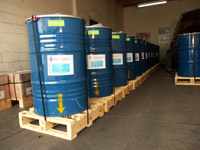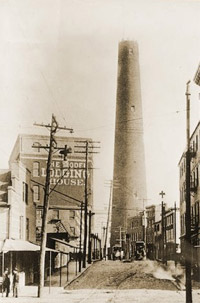Shot
Since 1943, our experience in the
process of manufacturing lead products has enabled us to produce
shot of the highest quality, whether for hunting or skeet shooting.
Our lead shot are manufactured using the most modern equipment,
specialized staff, the best materials and the strictest quality
control standards, allowing us to obtain a uniform product and to
ensure a strict control of the diameters, spherical form, brightness
and hardness.
Our company uses casting systems and
also pressing systems for large sizes.
The design of our packaging
guarantees a perfect conservation of the product. All wood used for
packaging complies with the NIMF-15 standard.
| Dimensions |
|
 |
The diameters of our products are in conformance with
the American Standard regulation. We also manufacture other
smaller or larger sizes up to buck shot. Please, call us or
email us for other measures not included in the chart.
Shot
Size |
Diameter |
Ave. Pellet Count per Ounce (28 gr) |
|
Inches |
mm |
|
10 |
0.007 |
1.78 |
868 |
|
9 |
0.08 |
2.03 |
585 |
|
8 1/2 |
0.085 |
2.16 |
470 |
|
8 |
0.09 |
2.28 |
409 |
|
7 1/2 |
0.095 |
2.41 |
350 |
|
7 |
0.1 |
2.54 |
299 |
|
6 |
0.11 |
2.79 |
223 |
|
5 |
0.12 |
3.02 |
172 |
|
4 |
0.13 |
3.30 |
136 |
|
6 |
0.11 |
2.79 |
223 |
|
| Hardness |
|
 |
According to the alloy used, we can offer different
hardness for our product. We produce pellets with hardness
that equals a content of antimony between 2% and 5%. |
| Packaging |
The pellet is packed in two ways: |
 |
In cotton bags with reinforced seams and a heat sealed
plastic lining on the inside, which contain 11.33 kg (25
lb.). 80 bags per case = 908 kg (2000 lbs.).
External dimensions of the box:
50 cm Height x 56 cm Width x 96.5 cm Length |
 |
In metal cylinders, straped on a wooden pallet with a
plastic bag inside. The cylinders can weight 1360 kg (3000
lbs.) or 1450kg (3197 lbs.) The external dimensions of the
cylinder are:
56 cm Diameter x 86 cm Height |
The dream that
revolutionized the manufacturing of shot
During the mid-eighteenth century, two different methods were used
to make bullets and shots depending on their size. Large shots were
melted on molds, a fairly obvious method, although very hard to work
with and that also left marks on the joints. Another method, which
was used for smaller shot, consisted of pouring melted lead through
a sieve suspended several centimeters over a barrel with water. The
size of the sieve holes determined the diameter of the shot. This
second method was not perfect either, and the results were oval
shots with the figure of teardrops with a "tail”. It was necessary
then to pass them through a machine that would eliminate the major
flaws to finally get a roughly spherical shot.
 There
is a story that mentions that one night in 1782, a plumber from
Bristol, England, whose last name was Watts ended up drunk, and
unable to get home he spent the night sleeping at the base of the
steeple at Saint Mary Redcliff church. That night he dreamed that
from the top of the tower he dropped molten lead through a sieve and
this fell into a container with water. There is another version of
the dream, perhaps more in line with the fears of a married drunk
man. In this, Watts dreamed that his wife was the one who poured
molten lead at him from the church tower through the holes of a big
pan. However the idea came about, Watts and his wife decided to try
it. And they chose to do it at the church tower from the dream, so
they placed a barrel with water on the floor. The test was a success,
so after pouring molten lead it fell like raindrops and during the
fall, the air began to cool the metal cells, the water cushioned the
drop fall and solidify them. There was no more waiting. So Watts
decided to patent the process and in early 1785, he could implement
his idea. That year, Watts rented a house on Redcliff Hill, the same
street where he had a plumbing business, and he began what would
become the first "tower for shots manufacturing". Today, various
processes are used for the production of shots but there are still
some factories around the world, which currently use a tower like
the one Watts dreamed of.
There
is a story that mentions that one night in 1782, a plumber from
Bristol, England, whose last name was Watts ended up drunk, and
unable to get home he spent the night sleeping at the base of the
steeple at Saint Mary Redcliff church. That night he dreamed that
from the top of the tower he dropped molten lead through a sieve and
this fell into a container with water. There is another version of
the dream, perhaps more in line with the fears of a married drunk
man. In this, Watts dreamed that his wife was the one who poured
molten lead at him from the church tower through the holes of a big
pan. However the idea came about, Watts and his wife decided to try
it. And they chose to do it at the church tower from the dream, so
they placed a barrel with water on the floor. The test was a success,
so after pouring molten lead it fell like raindrops and during the
fall, the air began to cool the metal cells, the water cushioned the
drop fall and solidify them. There was no more waiting. So Watts
decided to patent the process and in early 1785, he could implement
his idea. That year, Watts rented a house on Redcliff Hill, the same
street where he had a plumbing business, and he began what would
become the first "tower for shots manufacturing". Today, various
processes are used for the production of shots but there are still
some factories around the world, which currently use a tower like
the one Watts dreamed of.
|
Safety Data Sheet SDS
|
 |